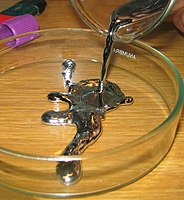
Photo from wikipedia
The electrochemical potential difference (Δμ̅) is the driving force for the transfer of a charged species from one phase to another in a redox reaction. In Li-ion batteries (LIBs), Δμ̅… Click to show full abstract
The electrochemical potential difference (Δμ̅) is the driving force for the transfer of a charged species from one phase to another in a redox reaction. In Li-ion batteries (LIBs), Δμ̅ values for both electrons and Li-ions play an important role in the charge-transfer kinetics at the electrode/electrolyte interfaces. Because of the lack of suitable measurement techniques, little is known about how Δμ̅ affects the redox reactions occurring at the solid/liquid interfaces during LIB operation. Herein, we outline the relations between different potentials and show how ambient pressure photoelectron spectroscopy (APPES) can be used to follow changes in Δμ̅e over the solid/liquid interfaces operando by measuring the kinetic energy (KE) shifts of the electrolyte core levels. The KE shift versus applied voltage shows a linear dependence of ∼1 eV/V during charging of the electrical double layer and during solid electrolyte interphase formation. This agrees with the expected results for an ideally polarizable interface. During lithiation, the slope changes drastically. We propose a model to explain this based on charge transfer over the solid/liquid interface.
Journal Title: ACS Applied Materials & Interfaces
Year Published: 2021
Link to full text (if available)
Share on Social Media: Sign Up to like & get
recommendations!